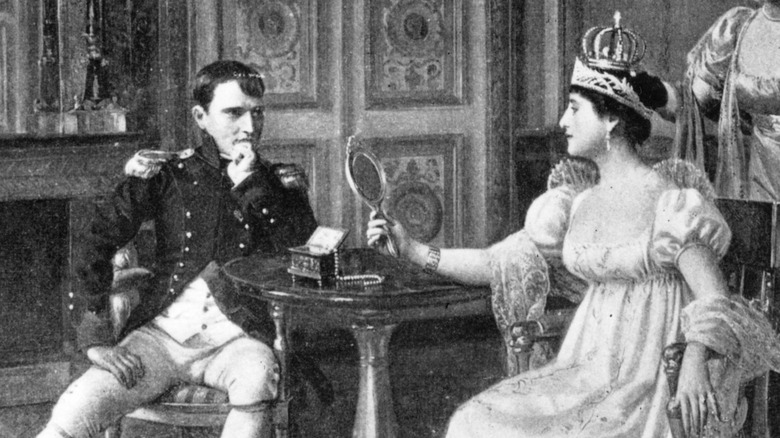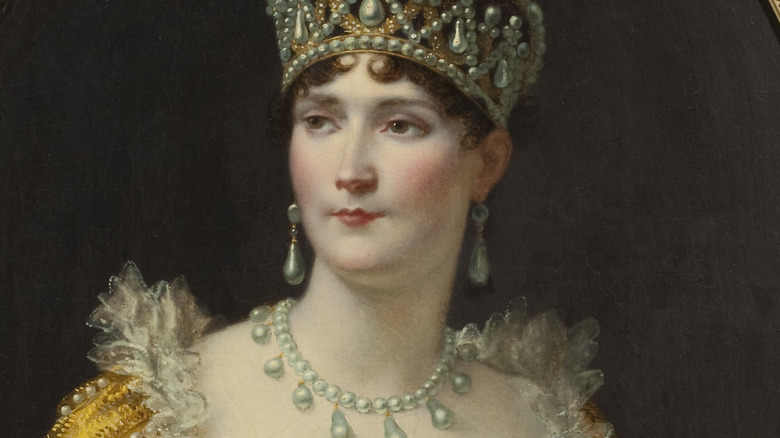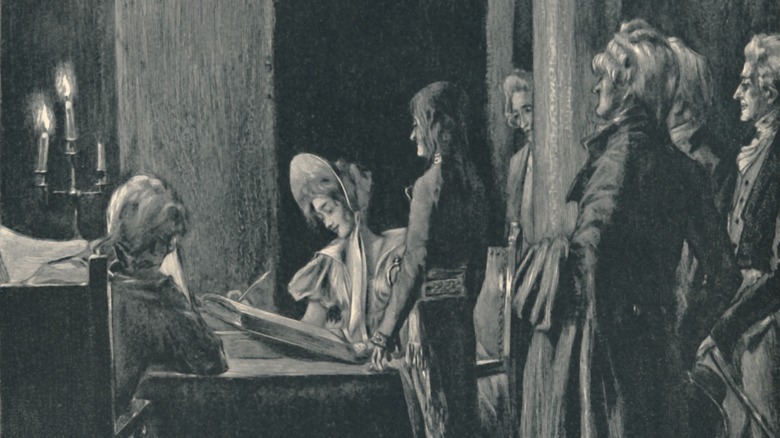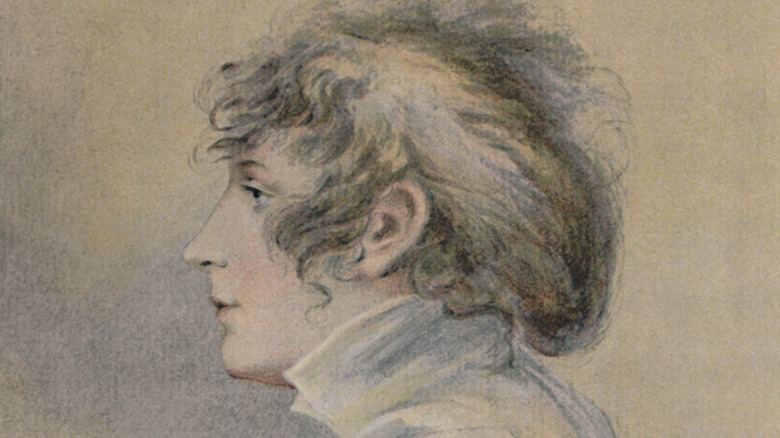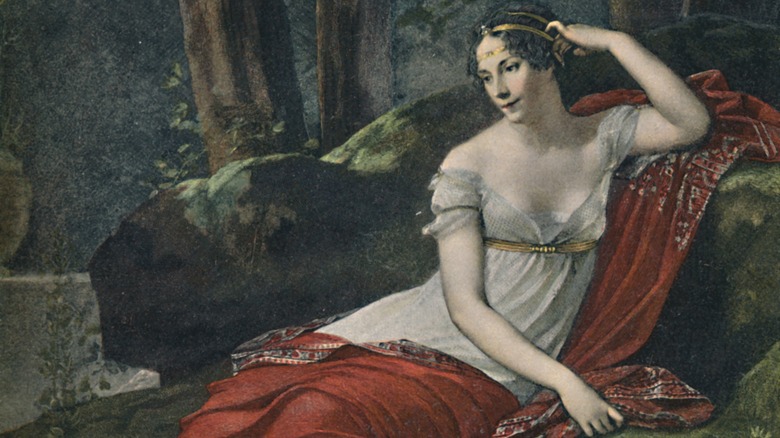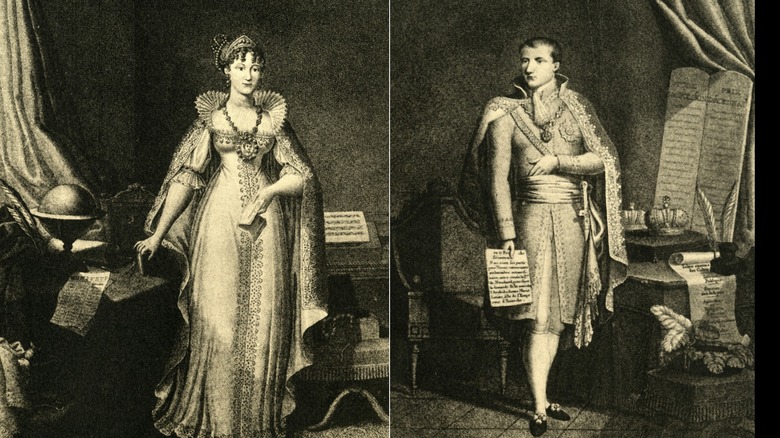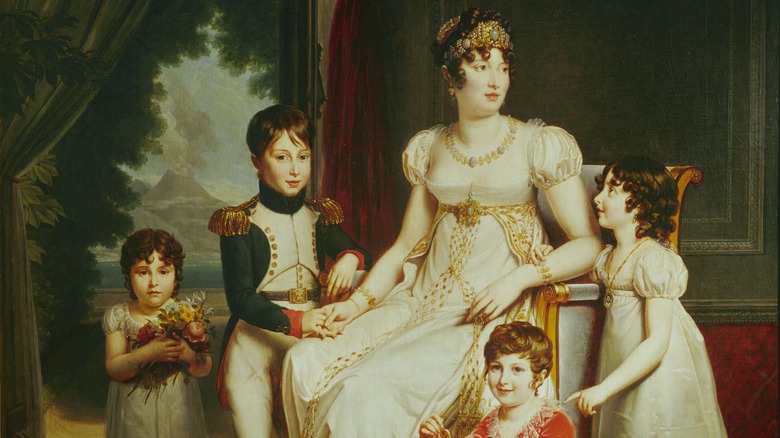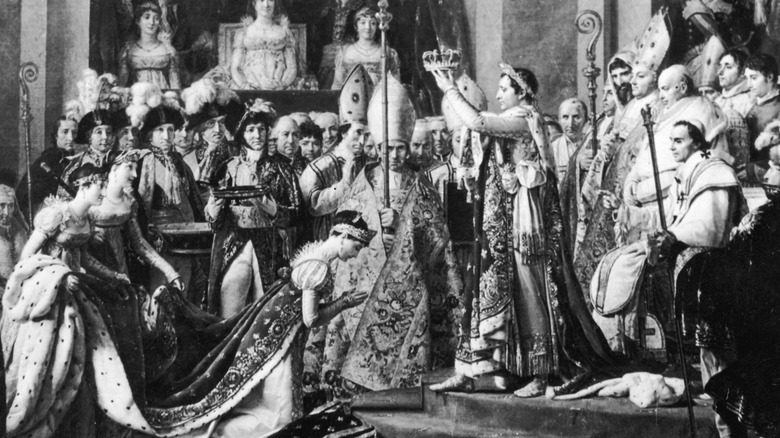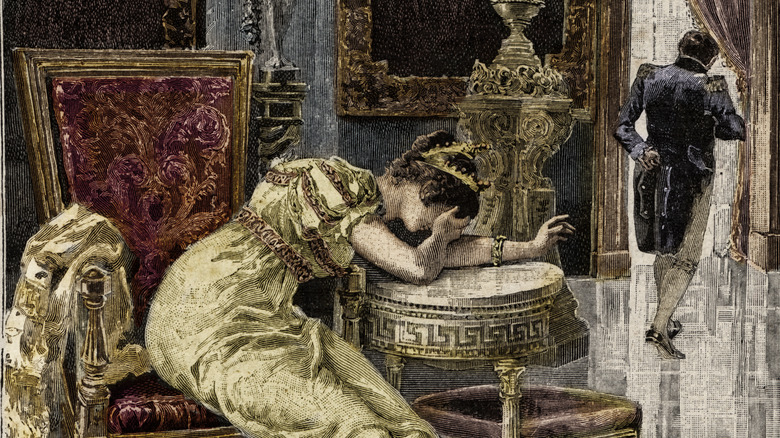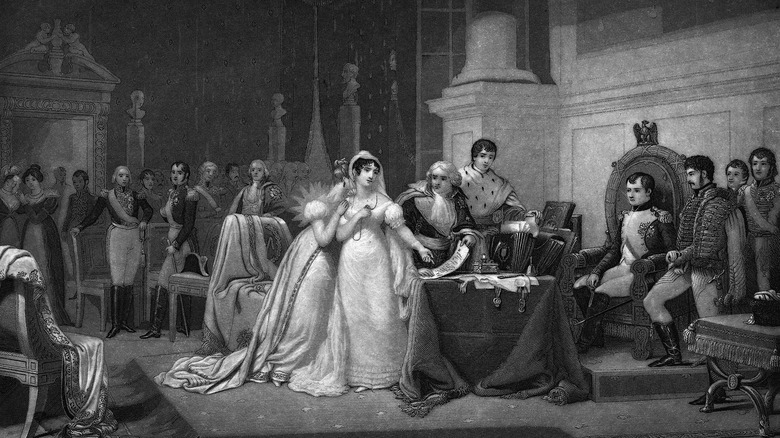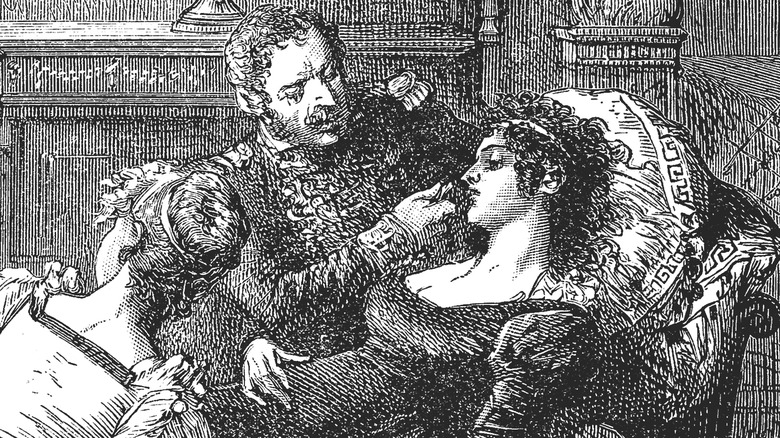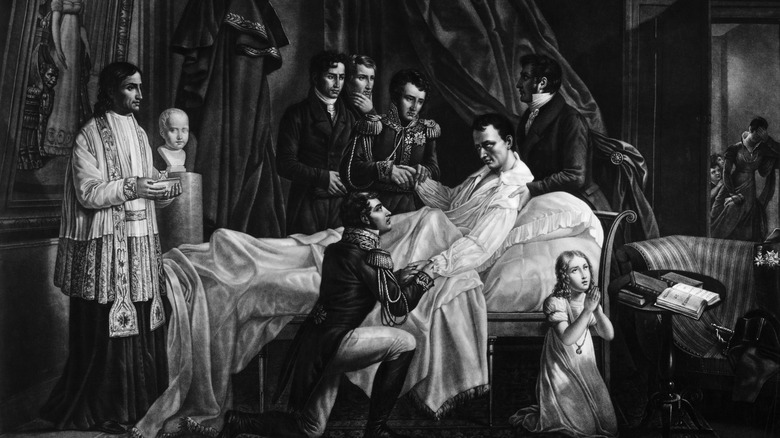Inside Napoleon's Complicated Relationship With His Wife Josephine
Napoleon Bonaparte is well-known as one of the greatest military leaders of all time, but less people know the details of his often volatile, manipulative, and always passionate romance with his wife, Josephine. Although she was born Marie-Josèphe Rose de Tascher de la Pagerie, she is remembered as the Empress Josephine Bonaparte. All three titles were given to her by Napoleon, who called her Josephine as a nickname, made her a Bonaparte by marriage, and declared her empress of France when he was crowned emperor.
Their tumultuous relationship was marked by shocking shifts in their power dynamics, with first one and then the other vying for their spouse's affection. They both were intensely jealous and at times had affairs with other people. They manipulated each other and often had screaming fights followed by passionate reconciliations. Through fights, affairs, divorce, and gaining and losing an empire, Napoleon and Josephine remained intensely devoted to each other.
Napoleon was obsessed with Josephine
Before Napoleon Bonaparte was the feared emperor of France, he was an ambitious 26-year-old major-general seeking a wealthy wife who would grant him access to another class of French elite. Instead, he found Josephine.
Josephine was an extremely feminine woman with a tiny waist, husky voice, and careful attention to makeup, who was extremely active in the social world of the Parisian elite. She was known for spending large sums of money even though she couldn't afford it. To maintain her lavish lifestyle and care for her two children from a previous marriage, she had a string of romantic partners and admirers, all of whom were wealthy. Napoleon was immediately obsessed with her and desperate to be one of her lovers. Josephine was less impressed by Napoleon. Not only was he six years younger than her, he was awkward and not particularly attractive — but he was smart, ambitious, and more than willing to provide for her. In 1795, the two became lovers.
In the early days of their relationship, he sent her many sexually charged letters, and his passion for her only grew the longer they were together. According to Kate Williams's "Ambition and Desire: The Dangerous Life of Josephine Bonaparte," by Kate Williams, he repeatedly asked her to marry him and would fly into blind rages when she said no. They were constantly having massive fights during which he would shout and she would sob, but she seemed infinitely forgiving, and the two always had a passionate reconciliation.
His family disapproved of her
Although Napoleon had desperately wanted to make Josephine his wife from the very beginning of their relationship, his family was highly against the match and made no secret of it. In particular Napoleon's brother and confidante Joseph mistrusted Josephine. They may have viewed Josephine as frivolous and been shocked by her promiscuous reputation, or even disapproved of the fact that she was 32 while Napoleon was 26. The most likely concern however was that she had been married before and had two children already.
Although Josephine was initially disinterested in Napoleon, his constant adoration and admiration must have been a major change from her first husband Alexandre de Beauharnais' attitude towards her. Although they were aristocrats, her family had very little money, and Josephine had been raised in the provinces. Her first husband found her provincial. As noted by the National Gallery of Victoria, he was also very likely in love with someone else and had little interest in his new 15-year-old wife.
In Josephine's new relationship with Napoleon, it appeared that she would be the one who was indifferent towards her spouse. Although she married Napoleon, she remained emotionally distant — at least at first.
Napoleon's family never warmed to her. Joseph in particular regularly tried to convince Napoleon that he should leave his wife.
Josephine had many lovers and was unimpressed by Napoleon
Although Josephine was only six years older than her lover Napoleon, she had already lived a full life before she met him. There were also many other men in her life, and at first he paled in comparison.
When Napoleon first met Josephine, he saw her as the height of Paris society, and in some ways, he was right. Both Josephine and her almost estranged first husband were imprisoned during the French Revolution. He was executed and she was about to meet the same fate, but by coincidence the revolution ended the day before she was going to be killed. After the Reign of Terror ended, those who had been imprisoned were fashionable and highly sought-after social guests. Her time in prison had taken a toll on her, however, and to survive on her own after her release, she relied on her social connections.
Josephine was in desperate need of money and was forced to have affairs with numerous powerful and wealthy men, whom she relied on their favor to keep her and her children alive. In comparison to the many other men in her life, Napoleon didn't seem impressive at first. As noted by author Sandra Gulland for PBS, he was awkward, had no sense of humor, and didn't take care of himself, which made him seem unattractive.
She was far more sexually experienced
Throughout her time in Paris, Josephine had used her sexuality as a way to attract powerful men and keep them interested. Napoleon on the other hand had far less sexual experience than his new lover and was fascinated and obsessed with her. While he was an extremely jealous partner who hated any man who interacted with Josephine, he was thrilled by her sexual prowess that had come from her experience with previous lovers.
As described in "Ambition and Desire," she took great care to make herself alluring to him, decorating her bedroom with mirrors and candles, wearing heavy perfume and makeup, and adopting an almost submissive persona. In bed, she was active and experimental, leading Napoleon to refer to her moves as "zig-zags." While it's likely that her previous sexual partners in Paris were accustomed to being with women who were sexually experienced and aware of their own seductive traits, for Napoleon it was all new.
Josephine's affair caused a scandal
Just a few days after the wedding, Napoleon went with the army to Milan. He begged his new bride to accompany him, but she refused. Alone in Paris, Josephine turned her attention to another man. When Napoleon heard rumors that his wife was having an affair, he returned home to confront her in person. Josephine performatively sobbed, cowered, and even pretended to faint from fear. So overwhelmed by her emotional response, he forgave her.
During his campaign in Egypt, Napoleon spoke rapturously about Josephine to anyone who would listen, but rumors that she was still unfaithful spread among his men. Finally, one of Napoleon's generals presented him with evidence –- a letter that proved Josephine had continued her affair. As described in "Ambition and Desire," Napoleon suffered some sort of fit and fell into depression.
Devastated, Napoleon wrote a letter to his brother expressing how broken-hearted he was at his wife's betrayal. This letter was captured by British forces and published in newspapers around the world. Their private affairs had become a public scandal. Josephine was scorned in Paris and retreated to a massive country estate. Incredibly, she continued to allow her lover to visit her there. When Napoleon heard that despite everything Josephine had not given up her affair, he embarked on one of his own with the wife of one of his junior officers. Napoleon made his affair as public as possible in hopes of making Josephine jealous.
Napoleon almost divorced Josephine in 1799
When Napoleon finally returned to France he was hailed as a returning champion, and everywhere he went was full of welcome parties and celebration. As described in "Ambition And Desire," his only thoughts were of Josephine. He still loved her and hoped for a reconciliation upon his arrival at her country estate. When he arrived, however, he found the house empty. Immediately, he assumed that she was with her lover. Scorned and depressed, he bent the ear of anyone listening — politicians, friends, and family — and threatened divorce. Most counseled him to use caution. Napoleon, however, decided to be rid of Josephine once and for all. He ordered the household servants to get rid of all of his wife's things that he had bought her and not to let her back into the house.
In reality, Josephine had tried to meet Napoleon on the road but had taken the wrong route. When she arrived back at their home, she forced her way inside. The two had a massive fight, which reportedly lasted all night, but by morning they were back together.
While the couple seemed to have reconciled after their year apart, their dynamic had changed forever. Before Napoleon had been passionately obsessed with his indifferent wife, now he was in control of their relationship. Josephine agreed readily to his demands, was far more affectionate towards him, and she likely never took another lover. Napoleon on the other hand had many affairs and did not bother to keep them a secret.
Josephine had to fight to become Empress
In 1804, Napoleon Bonaparte became Napoleon I, emperor of the French. Although Josephine was his wife, she had to fight to get herself named the empress. Napoleon's family had always disapproved of Josephine, and they tried to convince him that the best way to secure his future as emperor was to marry a princess. As described in "Ambition and Desire," Napoleon was extremely conflicted about the idea of leaving Josephine for a more politically advantageous wife, saying, "How can I put away this excellent woman just because I am becoming great?" Finally, Napoleon confided his internal debate to Josephine. Surprisingly, she didn't cry or fly into a rage when he told her that he was considering leaving her. Instead, she hatched a plan for the night before Napoleon's coronation to push him into naming her empress.
The night before the coronation, Josephine met with Pope Pius VII and told him that they had only been married in the eyes of the law, not in a religious ceremony that would make her and Napoleon married in the eyes of God. Pope Pius was horrified and insisted he would not crown Napoleon emperor without a proper Catholic wedding. With no time to convince the pope to change his mind, Napoleon was forced to marry his wife again and make Josephine the empress of France.
They couldn't have children
As empress, Josephine was highly popular with the French people, and Napoleon felt that she brought him good luck. She had official duties in her role and often hosted foreign officials, planned celebrations, and even represented her husband at official events. However, she was unable to do one crucial thing that was required of the emperor's wife: give him an heir.
The couple had tried for years to conceive without success. As described by Josephine's biographer Bernard Chevallier for PBS, Josephine effectively convinced her husband that since she already had two children of her own from a previous marriage, he must be infertile and would be unable to have children with anyone. In reality, it was Josephine who could no longer have children, something that she almost certainly knew. In 1806, however, one of Napoleon's mistresses became pregnant, and he realized that if he remarried he could have an heir to secure his legacy.
Josephine became increasingly frightened that her husband was going to leave her, or worse, that his family might have her killed. According to a letter Napoleon wrote to his brother, whenever Josephine felt sick, she became convinced that she had been poisoned to make way for a new bride who could give Napoleon an heir.
Napoleon divorced Josephine
In 1809, Napoleon told Josephine that he was leaving her so that he could find a wife who could provide him with an heir. Her screams and sobs were loud enough to be heard all over the palace, but his mind was made up.
Although they had been married for years, their separation was called an annulment. When Josephine and Pope Pius VII pushed Napoleon into a religious marriage ceremony before his coronation, they had neglected to invite a parish priest. Napoleon used this excuse to push the church to rule that the marriage had been done "badly and illegally" even though it had been at the urging of the pope. Some historians believe that Napoleon intentionally did not include a priest from the beginning so that he would be able to legally annul his marriage whenever he chose.
The emperor and empress made their separation official at a ceremony that was bizarrely romantic, reading statements to each other. In Napoleon's statement, he expressed his gratitude and ongoing devotion to his soon-to-be ex-wife and stated that he was only leaving her for the good of France. Josephine began reading her statement, in which she declared that allowing the divorce was the greatest proof of her love that she could offer, but she was too overwhelmed with emotion and had to ask a servant to finish reading it aloud. The two sealed their separation with a kiss, and the marriage was officially annulled.
Josephine talked about Napoleon on her deathbed
Although she was no longer married to Napoleon, Josephine remained France's official empress and queen. She continued to live at her country estate near Paris, where she hosted visiting royalty. Napoleon continued to support her financially. In 1814, Napoleon was forced to abdicate and sent into exile. Although her benefactor was out of power, Josephine secured the protection of the Russian emperor so her future seemed secure. Then, suddenly, Josephine contracted pneumonia. She would not survive.
In her final days, Josephine became delirious, and her servants reported that she was talking about Napoleon, occasionally saying "king of Rome," the title that Napoleon had given to the heir he had divorced her to have; "Elba," the island where her former husband had been exiled; and simply, "Bonaparte."
Josephine's maid reported that the empress had died of grief. Napoleon learned that his former wife had died when he read it in the newspaper. He took her death so soon after his exile as proof of her continued loyalty, locked himself in a dark room, and refused to eat for some time. Later, he wrote that "no woman was ever loved with more devotion, ardor and tenderness ... only death could break a union formed by sympathy, love and true feeling."
She was his final thought
Although they had been divorced, Napoleon remained passionate about Josephine for the rest of his life, and his feelings for her lasted long after her death. One of the first things that Napoleon did when he returned from exile was to visit Josephine's country estate, although she was dead. She had loved violets, and the gardens at the estate were full of them. Napoleon picked some of the flowers and placed them in a locket, which he wore for the rest of his life. When he was sent into his second exile, Napoleon kept many portraits of Josephine with him, including a collection of plates with her face on them.
Like Josephine who had talked about her former husband as she was dying, Napoleon is also believed to have been thinking about her on his deathbed. In fact, she may have been his final thought. It was reported that his last words were the three things that mattered most to him in life: "France," "the army," and finally "Josephine."
